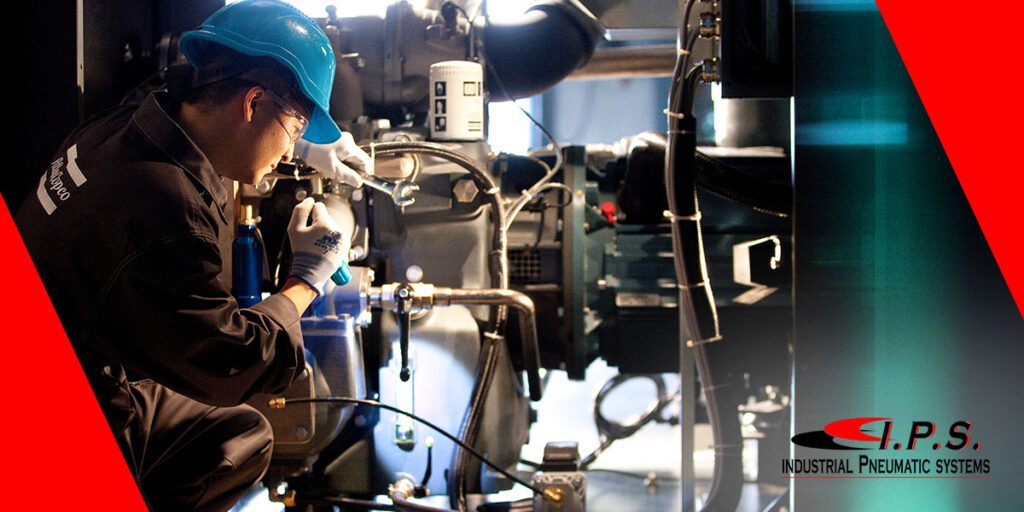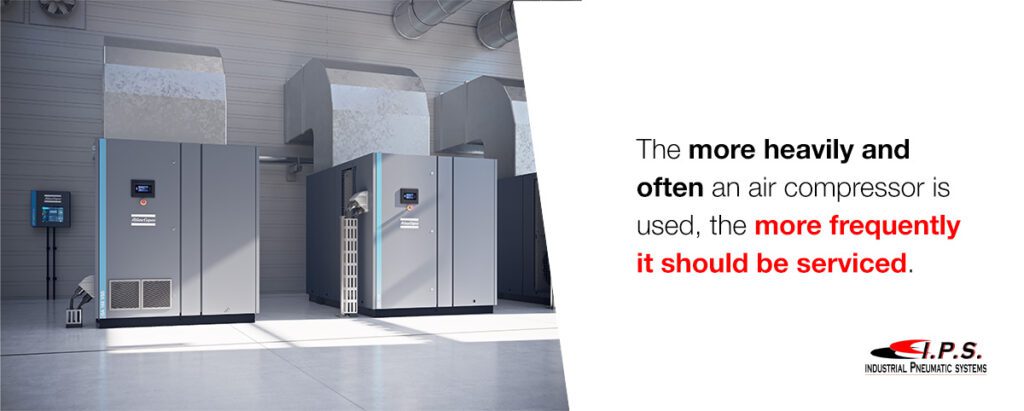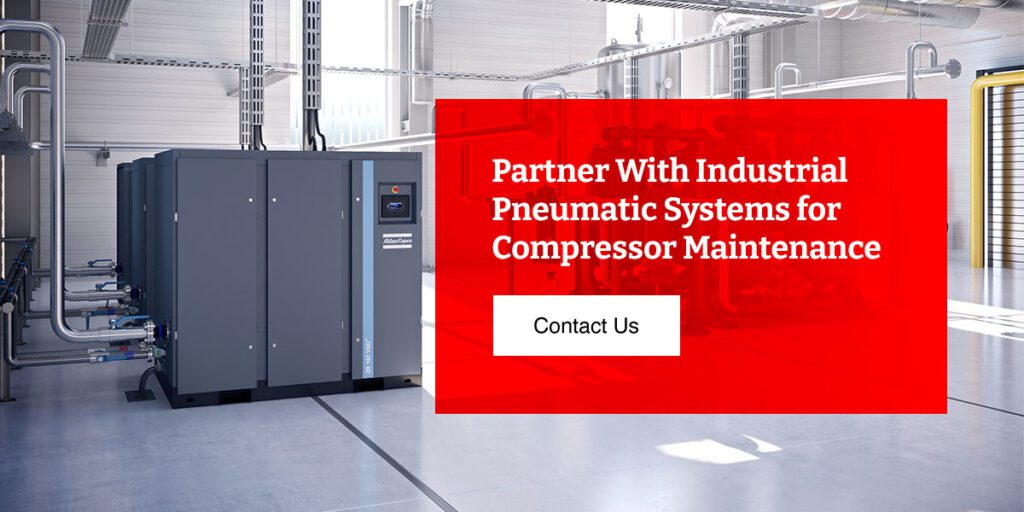
Every day, facilities in numerous industries depend on air compressors — manufacturing, health care, automotive, food and beverage, and more. As a maintenance manager, you know that regular air compressor inspections and servicing are vital to keep your system functional and reliable. Follow our air compressor maintenance tips below to ensure you give your equipment the care and attention it needs.
Standard vs. Preventive Air Compressor Maintenance
Standard air compressor maintenance usually involves basic, routine tasks like filter and oil changes as the need arises, helping extend the system’s lifespan. Preventive maintenance entails more exhaustive inspections and services, covering all system components. The goal is to identify and prevent problems before they become serious. By catching these issues early, you can take the necessary steps to rectify them before they progress.
Complex, high-tech machinery — such as industrial air compressors — needs more than standard maintenance. These compressors should have a comprehensive maintenance program that:
- Verifies all parts are working together as expected.
- Ensures optimal operating conditions, energy efficiency and performance.
- Minimizes emergency repairs, replacements and costly downtime.
Benefits of Preventive Maintenance for Industrial Air Compressor Systems
Regularly inspecting and maintaining your industrial air compressor can yield the following benefits:
- Enhanced performance: A well-maintained air compressor operates more efficiently, resulting in less strain on the equipment, lower energy consumption and improved performance.
- Extended equipment lifespan: Proper care and upkeep can maximize your compressor’s service life, allowing you to get the most out of your investment.
- Reduced downtime: Air compressor preventive maintenance addresses issues proactively before they escalate. This helps minimize the risk of more expensive repairs and breakdowns, reducing operational downtime.
- Cost savings: The cost of maintaining your air compressor is worth the long-term savings. You can avoid major repairs and replacements caused by equipment neglect.
What Should a Comprehensive Compressor Maintenance Program Cover?
Be sure to prioritize the following areas in your preventive maintenance checklist:
- Intake vents: These components pull ambient air into the unit. When dirt and contaminants build up in the vents, the air compressor must work harder to produce clean air. Regularly cleaning the vents is necessary to keep the system running efficiently.
- Filters: Oil filters are responsible for filtering out contaminants from the lubricating oil. Over time, oil can diminish the quality of the compressed air, so these filters should be replaced at the recommended intervals for your equipment. Likewise, air filters are essential to prevent particulates like dust, water and dirt from entering the unit. They should also be cleaned and replaced periodically for optimal performance.
- Belts: Rubber air compressor belts require proper tension to keep the system functioning properly. They should be firm yet flexible to balance these internal movements. However, these belts can eventually deteriorate, loosen and even crack or snap. Regularly inspect and replace them as needed to prevent these issues.
- Bearings: Rust can cause the motor bearings to stick and slow down, potentially leading to motor failure. Regularly check and grease these bearings to prevent corrosion. Other moving parts, such as pistons, also require lubrication to maintain equipment performance and longevity. Check the manufacturer’s guidelines for these suggested service intervals.
How Often Should Air Compressors Be Serviced?
Most air compressor systems should be serviced at least once a year. However, more frequently used compressors may require shorter intervals, such as quarterly or even monthly, between services. The equipment manufacturer’s recommendations can help you determine how often to service your unit, so always refer to these guidelines.
Other factors can also influence these servicing requirements:

- Environment: Air compressors that operate in dirty, humid or dusty conditions typically demand more maintenance. These contaminants can degrade oil, clog filters and damage components, requiring more frequent part replacements and cleaning.
- Compressor type: Different types of air compressors have varying maintenance needs. For instance, reciprocating air compressors may require more frequent oil changes than their rotary-screw counterparts.
- Usage: The more heavily and often an air compressor is used, the more frequently it should be serviced. A compressor that runs daily will have stricter maintenance needs than an occasionally used one.
- Equipment age: Older compressors generally require more frequent maintenance as components wear out over time.
Recommended Air Compressor Maintenance Checklist and Schedule
Industrial air compressor maintenance requirements can vary based on your unique facility, environment and equipment. Always consult your air compressor’s manual for specific guidance. Below are some general guidelines and key areas to cover for a comprehensive maintenance program.
Daily
Try to perform the following preventive maintenance tasks each day:
- Inspect oil levels and lubrication.
- Confirm that the compressor has cooled down completely after shutting it off.
- Check all the controls to ensure they work.
- Look for visual signs of damage, such as fluid leaks, damaged belts or corrosion.
- Listen for unusual noises or vibrations.
- Check for external factors that could affect performance, such as excess dust.
- Drain condensate from the tank.
Weekly
Checking these components at least once a week is a good idea:
- Dryer
- Coolers
- Temperature
- Display readings
- Voltage and amperage
- Condensation buildup
- Oil levels
- Belts
Monthly
Some preventive maintenance tasks to conduct monthly include:
- Inspect and clean the drain valves, air filters and dryer.
- Check the belts for wear and tension, adjusting or replacing them as needed.
- Examine the hoses and connections for air leaks.
- Inspect the overall condition of the air compressor system.
Quarterly
Aim to perform the following tasks about every three months:
- Change the oil.
- Replace the oil filter if needed.
- Examine the safety valves.
- Inspect the torque on the pulley screws and nuts.
- Look at the contact points of the motor area and the pressure switch.
- Check how many hours the unit has run.
Annually
Once a year, try to:
- Perform a comprehensive inspection of all system components.
- Replace the air and oil separators if necessary.
- Have a qualified technician inspect the system.
Other Air Compressor Maintenance Tips
Keep these best practices in mind when implementing your preventive compressor maintenance program:
- Watch for pressure drops: Pressure drops occur when the compressed air’s pressure decreases within the system. Although pressure drops are normal, major drops can put excess stress on your air compressor. If any system components are displaying wear and tear, replace them before they cause significant pressure drops.
- Monitor moisture and condensation levels: As the air compressor removes moisture from the air, condensation can accumulate. Over time, this can degrade air quality, cause premature corrosion and damage electrical circuits. Temperature fluctuations and humidity can also lead to condensation. Check for condensation buildup and clear it as needed.
- Keep detailed maintenance records: Record all maintenance activities and when they were performed. This log will be a helpful reference point for future servicing and troubleshooting.

Partner With Industrial Pneumatic Systems for Compressor Maintenance
At Industrial Pneumatic Systems, our factory-trained technicians provide the comprehensive services needed to maximize your industrial air compressor’s lifespan. Our team can help you develop a preventive maintenance program customized to your business, equipment and facility.
Our flexible maintenance agreements cover fundamental services for your unit, and we can tailor the terms to your unique schedule and requirements. We also address repair needs as they arise, including air or oil leaks, pressure drops, broken components or other issues.
Contact us today to schedule a consultation with our experts and discuss your maintenance needs.
